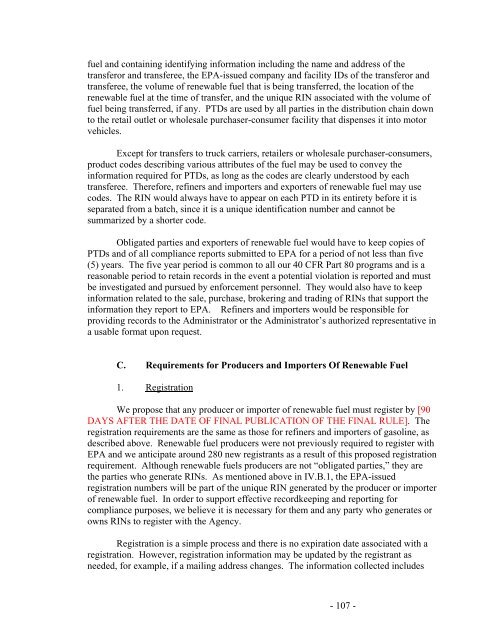Regulation of Fuels and Fuel Additives: Renewable Fuel Standard ...
Regulation of Fuels and Fuel Additives: Renewable Fuel Standard ...
Regulation of Fuels and Fuel Additives: Renewable Fuel Standard ...
You also want an ePaper? Increase the reach of your titles
YUMPU automatically turns print PDFs into web optimized ePapers that Google loves.
fuel <strong>and</strong> containing identifying information including the name <strong>and</strong> address <strong>of</strong> the<br />
transferor <strong>and</strong> transferee, the EPA-issued company <strong>and</strong> facility IDs <strong>of</strong> the transferor <strong>and</strong><br />
transferee, the volume <strong>of</strong> renewable fuel that is being transferred, the location <strong>of</strong> the<br />
renewable fuel at the time <strong>of</strong> transfer, <strong>and</strong> the unique RIN associated with the volume <strong>of</strong><br />
fuel being transferred, if any. PTDs are used by all parties in the distribution chain down<br />
to the retail outlet or wholesale purchaser-consumer facility that dispenses it into motor<br />
vehicles.<br />
Except for transfers to truck carriers, retailers or wholesale purchaser-consumers,<br />
product codes describing various attributes <strong>of</strong> the fuel may be used to convey the<br />
information required for PTDs, as long as the codes are clearly understood by each<br />
transferee. Therefore, refiners <strong>and</strong> importers <strong>and</strong> exporters <strong>of</strong> renewable fuel may use<br />
codes. The RIN would always have to appear on each PTD in its entirety before it is<br />
separated from a batch, since it is a unique identification number <strong>and</strong> cannot be<br />
summarized by a shorter code.<br />
Obligated parties <strong>and</strong> exporters <strong>of</strong> renewable fuel would have to keep copies <strong>of</strong><br />
PTDs <strong>and</strong> <strong>of</strong> all compliance reports submitted to EPA for a period <strong>of</strong> not less than five<br />
(5) years. The five year period is common to all our 40 CFR Part 80 programs <strong>and</strong> is a<br />
reasonable period to retain records in the event a potential violation is reported <strong>and</strong> must<br />
be investigated <strong>and</strong> pursued by enforcement personnel. They would also have to keep<br />
information related to the sale, purchase, brokering <strong>and</strong> trading <strong>of</strong> RINs that support the<br />
information they report to EPA. Refiners <strong>and</strong> importers would be responsible for<br />
providing records to the Administrator or the Administrator’s authorized representative in<br />
a usable format upon request.<br />
C. Requirements for Producers <strong>and</strong> Importers Of <strong>Renewable</strong> <strong>Fuel</strong><br />
1. Registration<br />
We propose that any producer or importer <strong>of</strong> renewable fuel must register by [90<br />
DAYS AFTER THE DATE OF FINAL PUBLICATION OF THE FINAL RULE]. The<br />
registration requirements are the same as those for refiners <strong>and</strong> importers <strong>of</strong> gasoline, as<br />
described above. <strong>Renewable</strong> fuel producers were not previously required to register with<br />
EPA <strong>and</strong> we anticipate around 280 new registrants as a result <strong>of</strong> this proposed registration<br />
requirement. Although renewable fuels producers are not “obligated parties,” they are<br />
the parties who generate RINs. As mentioned above in IV.B.1, the EPA-issued<br />
registration numbers will be part <strong>of</strong> the unique RIN generated by the producer or importer<br />
<strong>of</strong> renewable fuel. In order to support effective recordkeeping <strong>and</strong> reporting for<br />
compliance purposes, we believe it is necessary for them <strong>and</strong> any party who generates or<br />
owns RINs to register with the Agency.<br />
Registration is a simple process <strong>and</strong> there is no expiration date associated with a<br />
registration. However, registration information may be updated by the registrant as<br />
needed, for example, if a mailing address changes. The information collected includes<br />
- 107 -
















